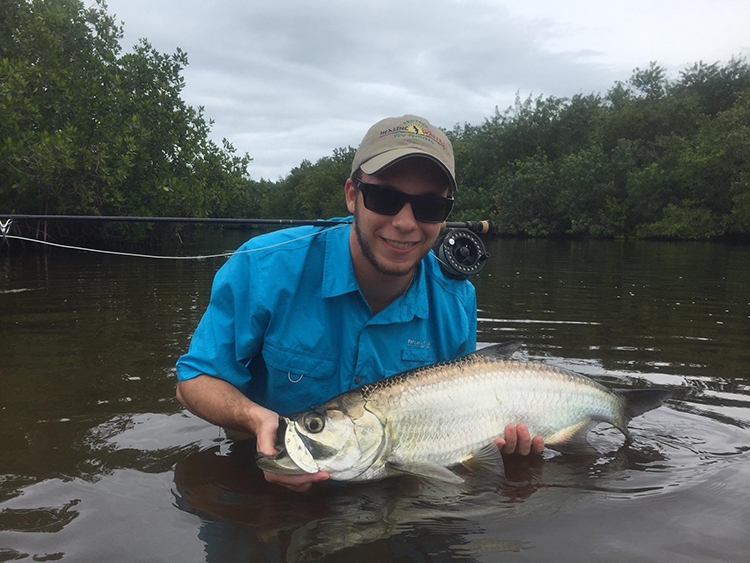
A two-year scientific study underway at the Bee Gum Point Preserve on the east side of the Indian River Lagoon may yield important information to help control mosquitoes, enhance sport fish populations, and improve the overall health of the 156-mile estuary.
Directed by Florida Tech Professor Emeritus Dr. Jon Shenker and Bonefish & Tarpon Trust scientific and conservation director Dr. Aaron Adams, with field work conducted by graduate students from Harbor Branch Oceanographic Institute, the research focuses on how popular game fish such as snook and tarpon use the 100-plus acres of manmade mosquito ditches at Bee Gum Point.
The mosquito impounds are owned by the Indian River Land Trust and managed by the Indian River County Mosquito Control District.
Marine scientists have known for decades that mangrove marshes along the lagoon are not just breeding grounds for mosquitoes, but also function as important nursery habitat for juvenile snook and tarpon.
So along with diking and flooding mud flats to prevent mosquitoes from breeding from April to August, local mosquito control districts have installed culvert pipes with gates to connect the impoundments with the main lagoon. They usually open the gates from fall through spring when the insects are not reproducing to enable young fish to move freely into sheltered water where they are safer from predators and move back out as they mature.
The overall impound strategy was effective in drastically reducing the mosquito population while cutting the district’s use of harmful pesticides, but wasn’t so good for sport fish populations, as a study published by Shenker and his colleagues in 2019 demonstrated.
The researchers implanted small snook and tarpon they caught in Bee Gum Point Preserve with tiny tags under the skin, similar to microchips veterinarians insert in dogs and cats.
They also installed receivers in the impoundments near the culverts to pick up the tags’ signals and “get a feel for who is leaving and who is staying,” Shenker said.
Shenker said the scientists expected to find that the baby fish would flee the impoundments with the approach of winter cold fronts. But instead, they stayed put and later made a beeline for the exits at the beginning of mosquito breeding season in April, at a time when the impoundment gates were closed.
When the scientists got permission from the mosquito control district to open the gates temporarily in the summer as an experiment, the fish rushed out in droves.
“Our first study showed that juvenile tarpon and snook preferred to migrate out of the impoundments to join the main fish populations in the lagoon during the summer months,” Indian River Land Trust director of land stewardship Dave Fuss wrote in an email.
Keeping the fish contained when they are ready to migrate interferes with their life cycles and the overall success of fish populations.
Added Shenker: “They are waiting till they are genetically programmed to go into bigger bodies of water and join the adult population.”
The current study involves catching and tagging more fish – with help from the Treasure Coast chapter of the Coastal Conservation Association – and continuing experimental culvert openings in the summer.
“The aim of the current study is to show that this management tactic applied across Indian River Land Trust’s approximately 800 acres of mosquito impoundments will boost the nursery production of these important game fish,” Fuss wrote.
“Not only are these fish important for their own sake, but as an indicator species – think about the canary in the mine – that will reveal the larger health of the lagoon. If successful, this approach could be adopted across thousands of acres of mosquito impoundments which would have a tremendous impact on the fish, the lagoon, and beyond.”
The fish tagging project could use some more angler volunteers. If you would like to help out, contact Harbor Branch graduate student and volunteer coordinator Maggie Rodrigue at mrodrigue2020@fau.edu.



